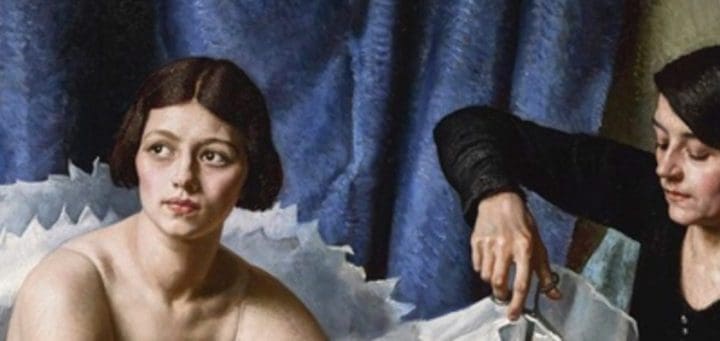Dame Laura Knight was an extraordinarily gifted painter, who despite being painfully shy in her early years, later developed a great sense of personal style and strength of character and honed her true genius for colour and composition.

Laura Knight – Artist’s Self Portrait, at her easel, public collection
Laura had a great lust for life and embraced everything it threw at her; from being a teaching assistant at Nottingham School of Art, aged 13, via the shores of North Yorkshire and Cornwall and following critical success becoming the first ever female Royal Academician. She was also the only female War artist in World War Two, covering the Nuremberg War Crime trials as the official British artist, with her career culminating in1963 with being the first female artist to have a full retrospective exhibition of her work at the Royal Academy.

Laura Knight – Nuremberg war crimes trials, collection of the Imperial War Museum
What a life! Laura really packed everything in. She had a very pale ‘English Rose’ complexion and blushed very easily, especially when confronted by ‘chaps’ other than her husband, the painter Harold Knight whom she married in 1903. For those of you who like movies featuring real artists, you can see Laura on Netflix in the flesh as it were in the 2013 movie ‘Summer in February’ starring Dominic Cooper as the painter Alfred Munnings, Laura is brilliantly played by Hattie Morihan and the movie is set in Lamorna, Cornwall.

Laura Knight – On the Cliffs, Cornwall. Signed, oil on canvas, 63 x 76 cms. Sold December 2009, £ 646,050 the current world record price
The action takes place in February of 1913. As Spring comes early down there, it was during what proved to be the last golden, warm, and peaceful Cornish Spring before the destruction and devastation of WW1 arrived in 1914. Laura is tongue-tied and red in the face whenever she is confronted by the roguish painter Alfred Munnings (Dominic Cooper is just playing himself I think!), who takes every opportunity to embarrass Laura with his advances whenever Laura’s husband Harold was nowhere to be seen.

Laura Knight, Ballet Girl and Dressmaker, signed, oil on canvas, 96 x 122 cms. Sold July 2018, £322,000
Laura learned painting from her mother who taught at Nottingham School of Art. When she was only13 her mother became terminally ill and Laura effectively took on her role. She married her childhood friend the painter Harold Knight (1874-1961) in 1903 and they moved to join the Staithes artists’ colony based on the North Yorkshire coast due north of Whitby, living and working in or near the village of Staithes .

Laura Knight – Packing Fish, Staithes, oil on canvas, 60 x 50 cms. Sold March 2013, £20,000
Her style is quite different in Staithes. As money was tight, she painted mostly in watercolour there. However, the work is very charming. She loved the local people and depicted their daily life in low-ceilinged, poorly lit interior with figures using muted and subtle colours.

Laura Knight – Marsh Mallows, Cornwall. Oil on canvas, 76 x 64 cms. Sold Dec 1999, £331,500
The Knights moved to Cornwall in 1907 and by 1908 Laura’s style had transformed under the influence of the warm, brilliant light, dazzling blue green seas and glorious sunny days. All this lifted her palette and her work to new heights. When this new work was first shown at the Royal Academy it caused a sensation and even today these truly remarkable Cornish pictures always command the highest prices.

Laura Knight – Munitions worker, collection of the Imperial War Museum
Laura Knight was a great painter in the British Impressionist tradition and a trailblazer for women artists of the 20th Century. Both Laura and Harold enjoyed critical and financial success, with Laura notably arriving in her Rolls-Royce to paint at the Epsom Derby. She was also amazingly productive, painting continuously for well over 50 years.

Laura Knight – A dull day Epsom, oil on canvas, 63 x 76 cms. Sold may 2014, £88,000
She was always on the hunt for new subjects, which in addition to Staithes and Cornwall include; the theatre, ballet, the circus – with all its players and characters – glamour girls and ladies, horse racing, fairgrounds, landscapes… She was a remarkably busy lady indeed, so luckily for the collector there are many buying opportunities, from fine black and white etchings for not much money, to drawings and sketches, and watercolours and oils.
Jonathan started his career in the art world at the legendary London picture dealer Thomas Agnew and then to Christie’s in King Street as Director, Auctioneer and Head of Modern British pictures where in recognition of his wide knowledge base Jonathan was also appointed head of British and Irish Art, International Director of the 19th European picture department and Deputy Chairman.







